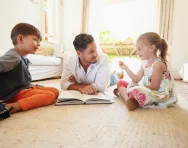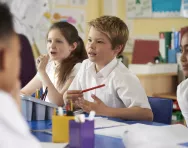Important update from TheSchoolRun
For the past 13 years, TheSchoolRun has been run by a small team of mums working from home, dedicated to providing quality educational resources to primary school parents. Unfortunately, rising supplier costs and falling revenue have made it impossible for us to continue operating, and we’ve had to make the difficult decision to close. The good news: We’ve arranged for another educational provider to take over many of our resources. These will be hosted on a new portal, where the content will be updated and expanded to support your child’s learning.
What this means for subscribers:
- Your subscription is still active, and for now, you can keep using the website as normal — just log in with your usual details to access all our articles and resources*.
- In a few months, all resources will move to the new portal. You’ll continue to have access there until your subscription ends. We’ll send you full details nearer the time.
- As a thank you for your support, we’ll also be sending you 16 primary school eBooks (worth £108.84) to download and keep.
A few changes to be aware of:
- The Learning Journey weekly email has ended, but your child’s plan will still be updated on your dashboard each Monday. Just log in to see the recommended worksheets.
- The 11+ weekly emails have now ended. We sent you all the remaining emails in the series at the end of March — please check your inbox (and spam folder) if you haven’t seen them. You can also follow the full programme here: 11+ Learning Journey.
If you have any questions, please contact us at [email protected]. Thank you for being part of our journey it’s been a privilege to support your family’s learning.
*If you need to reset your password, it will still work as usual. Please check your spam folder if the reset email doesn’t appear in your inbox.
How debating can benefit your child

What’s debating all about?
If your child has a talent for arguing that black is white, you might assume that he will be naturally skilled in the art of debating.
But a good debate is more than just an argument: ‘It’s the ability to see one statement or idea from various perspectives, through critical thinking, critical listening and critical speaking,’ says Leela Koenig, a team leader in the English-Speaking Union’s Speech and Debate department.


Boost Your Child's Learning Today!
- Start your child on a tailored learning programme
- Get weekly English & maths resources sent direct to your inbox
- Keep your child's learning on track
A good debate has four separate components:
- Reasoning and evidence: turning facts and statistics into a strong argument.
- Expression and delivery: being able to speak with the right pace, tone, language and body language to engage an audience and convey your argument.
- Listening and responding: listening critically to the other side’s argument, and using what you hear to develop a well-reasoned response.
- Organisation and prioritisation: knowing how to structure your speaking, and when to say the things you want to say.
How can debating benefit your child?
Learning how to debate has many benefits for primary school children. ‘It helps them develop their speaking skills and ability to express themselves verbally in front of a group, which builds confidence,’ says Debbie Newman, founder and director of The Noisy Classroom, a website and training organisation dedicated to promoting speaking and listening in schools. ‘It builds their critical listening skills and their ability to respond to what other people are saying, and teachers find that it has a knock-on effect on children’s written work, as it helps them understand how to structure their work and make their points clearly.’
Recent research from the University of Bedfordshire and the English-Speaking Union revealed that learning to debate can improve children’s SATs results by between six and 19 per cent in all subjects.
Learning to debate can help children to develop their research skills. ‘Research can be an important part of debating, especially if you’re setting children a topic that they don’t know much about,’ says Debbie. ‘However, some debates, particularly those on subjects that are close to children’s own experiences, involve no preparation at all, and encourage them to think on their feet: an equally important skill.’
Through debating, children can broaden their horizons and begin to explore big ethical questions. ‘Teaching them to see things from a range of perspectives is a real life skill that will help them as they move on into secondary school and beyond,’ explains Leela. And it builds self-esteem, too: ‘It’s highly validating for children to be asked for their opinion, and shows them that their thoughts and voice matter,’ Leela adds.
Debating in primary schools
There’s no National Curriculum obligation for primary schools to teach debating, so how much – if any – is done depends entirely on the school. Some run regular debates in the classroom, either as a whole class or in small groups; others will just have occasional debating sessions. ‘Debating can be a really useful tool for teachers, and can be used to explore issues across many areas of the curriculum,’ says Leela.
Debating clubs are also growing in popularity, and many offer children the opportunity to take part in competitions, against other teams from the same school (for example, inter-house debates) or from other schools, locally or nationally.
Argument text is a written form of debating; most children will write opinion / argument pieces in KS2.
Great topics to debate with your child
Children tend to like debating topics that are relevant and accessible to their own experience, such as:
- Should children be allowed to choose their own bedtime?
- Should homework be banned in primary schools?
- Should the voting age be lowered to 10?
- Should children be allowed to elect their own teachers?
- Should children get paid for getting good grades?
- Should you donate some of your pocket money to charity?
- Should bullies be expelled from school?
Although you may not be able to have a fully structured debate at home with your child, talking about issues like these will encourage his debating skills. ‘Having lots of dialogue and discussion with your child, and asking his opinion on a range of topics, will help him develop the skills he needs for debating,’ says Debbie. ‘The more quality talk there is at home, the better.’
We also have thought-provoking debate topic suggestions that kids will love getting their heads around in our 12 brilliant debate topics for kids article.
Primary debating resources are also available to download for free from the UK Parliament Education website.








